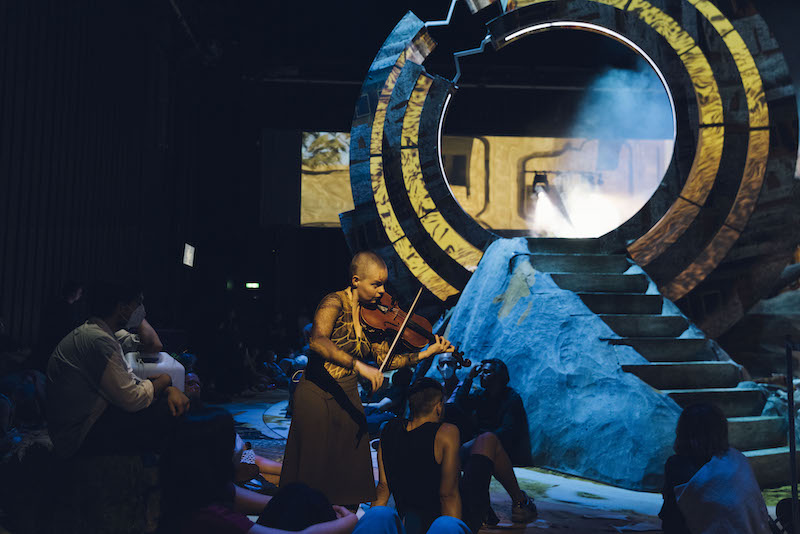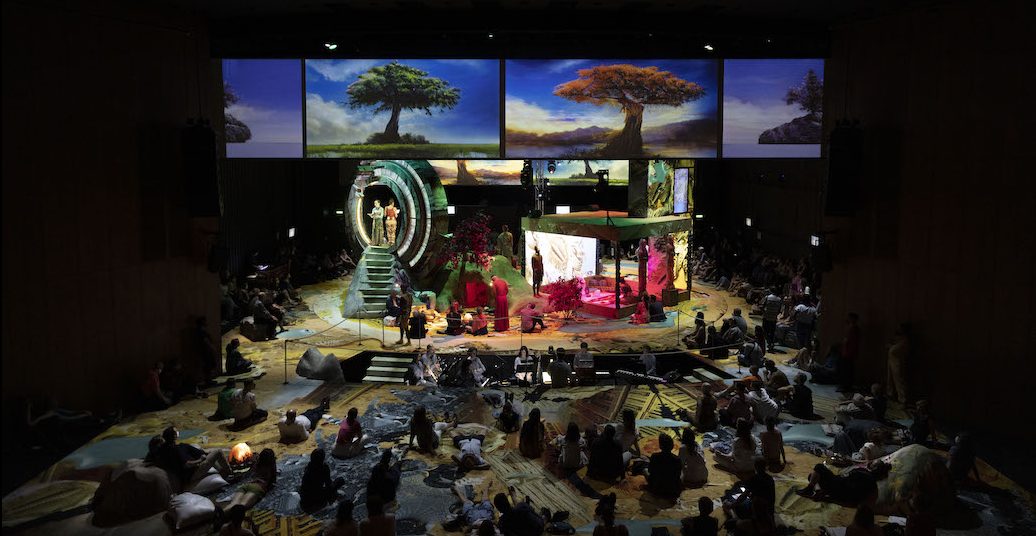Susanne Kennedy and Markus Selg’s “Einstein on the Beach” (30 June – 3 July 2022 at the Haus der Berliner Festspiele) reworks the minimalist opera classic for a maximalist era, playing with relativity, simultaneity, and how to feel time differently in an endless present.
Attention doesn’t work for me the way it did a decade ago — and that extends to spectatorship in the theatre. On the level of habit alone, new tics, like checking my phone, intrude. I experience time pretty differently these days, too, and I see that experience reflected in descriptions of postmodern time and rallying cries for rest as resistance. Technology, the speed of global information, the pace of work, round-the-clock availability of products, knowledge, and services — these are just some of the conditions that lead to a sense of everything-everywhere-and-all-at-the-same-time. Simultaneity soaks my worldview. It’s a noisy, imprecise simultaneity, where what matters isn’t which things happen at exactly the same time, but rather that there is always something else happening that you could be paying attention to.
“Einstein on the Beach,” which premiered in 1976 at the Avignon Festival, was groundbreaking for its time. This opera/opus was conceived by Philip Glass and Robert Wilson as a homage to Albert Einstein as a historical figure. It has no linear narrative and no biographical throughline. The new Susanne Kennedy and Markus Selg version of “Einstein” is a similar homage, though a through-and-through contemporary one, constructed from the fabric of the raucously simultaneous world I recognise. It investigates conditions clearly linked to Einstein’s theories — like how time feels, time as a feeling, and the inseparability of when-ness and where-ness — from a 2022 vantage point.
In this new staging of the work, the opera becomes a performance installation through which audience members can move at will. Proscenium options are available, from nabbing a seat in the auditorium for the most theatre-traditional perspective, to lounging around in the orchestra pit and gazing at the stage a bit like you might gaze up at a sunset over the waves from your towel on the beach. You can also choose to walk around the stage itself, including onto the revolving portion of the stage, which is in motion for most of the four-hour evening.
This new version of “Einstein” harmonised with my internalised temporality rather than challenging me to fight against it. It had the effect of inviting me into a playful relationship with the spacetime of the opera and opening me up to exploring what relativity might mean on a personal level. For me, this often developed into me observing the other observers. Sitting on the revolving stage, my gaze slid over those people who were stationary beyond its edge, and I watched them watching me back. Of course, I also watched the performers, who were not watching me. I could zoom in on them, getting up close and seeing the sweat behind their makeup. I could also pan out and watch the stage and the movements on it — the swirling fractal-like projections of motifs from nuclear power plant flags to tree rings, seasons to explosions, all unfold, and re-unfold, and re-re-unfold, deepening experience through repetition, in a similar way to Glass’s score. The action taking place around me often felt like ritual, but it was up to me to decide when I wanted to take the ritual as seriously as the performers, and when I wanted to step outside it.

Photo: Solo violinist Diamanda Dramm in “Einstein on the Beach” by Susanne Kennedy and Markus Selg © Eike Walkenhorst
There were moments during the four hours of the performance that seemed to knit together all the many discrete frames of reference created by the audience’s movement and ability to choose our perspective. Diamanda Dramm’s powerful violin solos bent eyes and ears around them, becoming a centre of gravity around which the theatre spun. Dramm’s virtuosity demanded a special quality of attention that slowed everything else in the space down. A quartet of goats that picked their way among the audience on two separate occasions were also powerful magnets for drawing together all of our scattered audience trajectories, although in their case, the special quality of attention belonged to the performers (that is, the goats) themselves. I spent many minutes lost in watching the goats assert their preferences to their human co-performers, ignoring the vegetable treats they were offered and insisting instead on eating mouthfuls of bread.
I was also struck by how the freedom of movement we enjoyed as audience members revealed to me how the music was shaping spacetime. There were moments when I felt compelled to change my frame of reference in the theatre, after a long period leaning against the same rock on the revolving stage, perhaps, or sitting in one seat in the auditorium, only to notice that a wave of other people seemed to be spontaneously relocating at the same time. Or a section of the music would draw me into wandering around the space without destination, drifting past other wanderers. With no explicit cues, we seemed to agree, as spectating bodies, on when stillness was right and when a change was coming. The music moved us or brought us to rest. Often, it was the loudest, quickest music that held us still. As we know from Einstein, the faster you’re moving, the slower time goes. The triumph of this “Einstein” for me was the way it unfolded the tempos and textures of different observational standpoints against the backdrop of everything-everywhere-and-all-at-the-same-time. It intervened in my experience of contemporary time as homogeneously breakneck, infinitely simultaneous, and flatly present. Instead of denying that experience of simultaneity, it encouraged me to play with it.
Programme brochure “Einstein on the Beach” (30 June – 3 July 2022 at the Haus der Berliner Festspiele, Premiere: 4 June 2022 at the Theater Basel) – Opera in four acts by Philip Glass and Robert Wilson. Concept: Susanne Kennedy, Markus Selg. Musical direction: André de Ridder, Jürg Henneberger. With the Basler Madrigalisten and Ensemble Phoenix.
Direction: Susanne Kennedy. Stage design: Markus Selg. Costume design: Teresa Vergho. Lighting design: Cornelius Hunziker. Voice Montage, sound design: Richard Alexander. Remix “Building/Train”: Andi Toma (Mouse on Mars). Sound direction: Robert Hermann. Video: Rodrik Biersteker, Markus Selg. Dramaturgy: Meret Kündig. Choreography: Ixchel Mendoza Hernández. Performance/Dance: Suzan Boogaerdt, Tarren Johnson, Frank Willens, Tommy Cattin, Dominic Santia, Ixchel Mendoza Hernández. Solo violin: Diamanda Dramm. Solo soprano: Álfheiður Erla Guðmundsdóttir, Emily Dilewski. Solo alto: Nadja Catania, Sonja Koppelhuber, Sarah Pagin.




